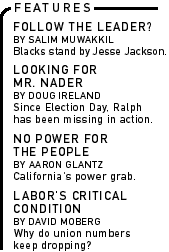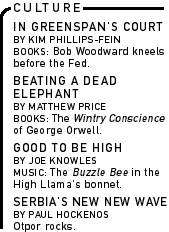

|

|

|

|
| |
|
|
|
Maestro: Greenspan's Fed and the American Boom In the early '60s, a young jazz musician named Alan Greenspan hung up his clarinet and went to graduate school to study economics. He was an unenthusiastic student, though, and his real education came in the apartment of the charismatic writer Ayn Rand. Rand, a Soviet émigré, called herself a "radical for capitalism." Her novels--part bodice-ripping romances, part tedious philosophical treatises--celebrated the absolute sovereignty of the individual human will. She believed that the postwar United States was evolving toward a quasi-totalitarian society, and that true capitalism was an "unknown ideal." Rand's beliefs extended to the minutiae of life; she chain-smoked because she thought cigarettes demonstrated the Promethean capacity to master fire. When she died of lung cancer in 1981, a six-foot-tall floral dollar sign stood beside her coffin. Greenspan was one of many conservative thinkers to file past that monument to lucre
Greenspan was compelled by Rand's argument that capitalism was the only social order that fully unleashed and rewarded individual will and reason. His biographer Justin Martin reports that Greenspan had believed in the technical efficiency of capitalism when he met Rand. But she convinced him of its moral rigor. The substance of that ethos was evident in a 1967 letter he wrote to the New York Times, defending his mentor's book against a hostile review. "Atlas Shrugged," he wrote, "is a celebration of life and happiness. Creative individuals and undeviating purpose and rationality ultimately achieve joy and fulfillment. Parasites who avoid either reason or purpose perish as they should." The past two decades have been kind to Alan Greenspan--but not to Bob Woodward, author of Maestro: Greenspan's Fed and the American Boom. When Greenspan was hanging out at Rand's apartment, Woodward had just started as a cub reporter at the Washington Post. His moment of glory, of course, came when he and Carl Bernstein broke the Watergate scandal. The early '70s were great days for journalists, whose skepticism about authority and faith in the power of the press reflected the insurgent spirit of the civil rights movement, the antiwar protests and the rising feminist movement. With hierarchies of all kinds being overthrown, why shouldn't a 28-year-old topple a president? But as the political culture grew conservative, Woodward grew restrained. Today, he is no longer a scrappy newspaperman but an Establishment journalist, who has traded independence for access, cynicism about power for interviews with those who wield it. Greenspan's rise parallels Woodward's decline, suggesting a larger transformation in how Americans think about the economy and what we expect from political life.
|


